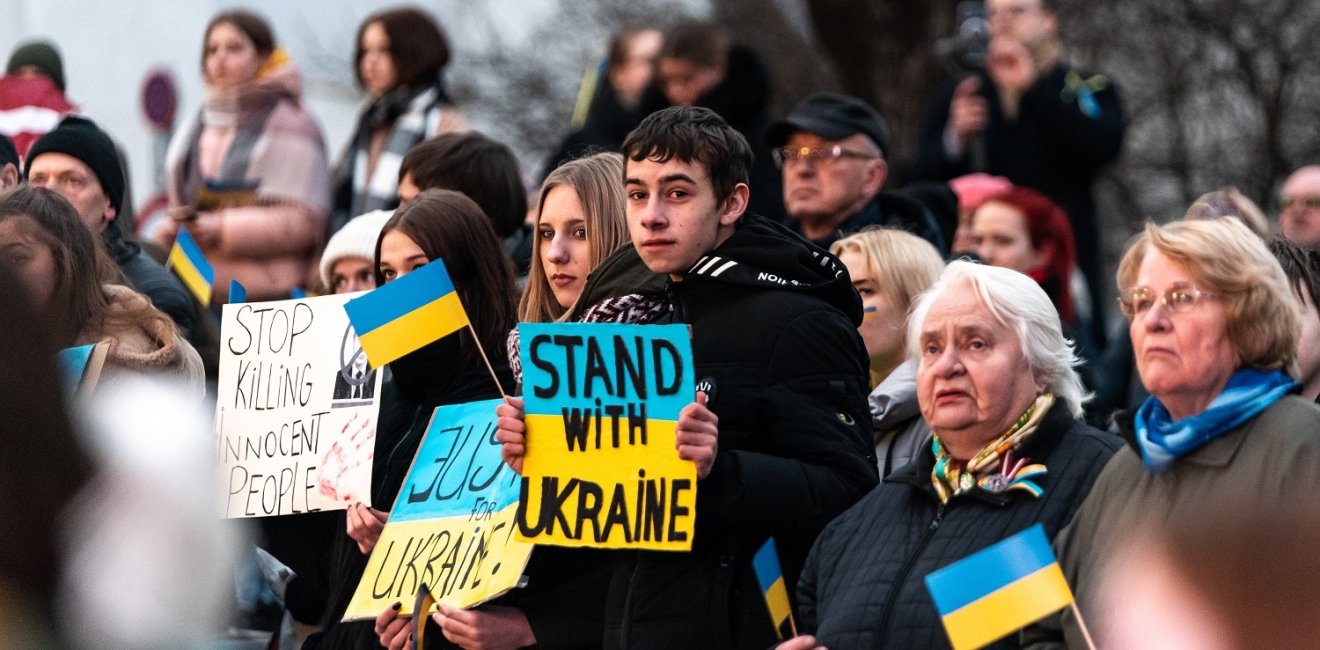
A blog of the Kennan Institute
The war in Ukraine has long ago entered a phase where no decisive battlefield victory is likely for either side. Despite its advances, Russia has really only achieved a series of pyrrhic victories. Every square kilometer Russia has occupied came at the cost of hundreds if not thousands of dead and wounded soldiers. From the other side, Ukraine understands that it lacks the human and military resources to reclaim the occupied territories through force of arms. The situation is at an impasse.
However, this stalemate is not forcing the opposing sides to end the conflict or search for compromises. Their refusal to negotiate lies first and foremost in fear. Without acknowledging and addressing the fears involved, no peace agreement can be reached.
Putin and Russia
Every political leader must confront two types of fears: societal fears (shaped historically) and personal fears (shaped by their own experiences). Russia has many historically ingrained fears, but perhaps the most significant is its deep mistrust of agreements with the West. For years, Putin has reinforced the narrative that “the West betrayed us,” which resonates strongly with Russian society. He exploited this fear to avoid a deal before the invasion, and it will remain a serious obstacle. He has repeatedly emphasized that Ukraine’s NATO membership is his ultimate red line. Russians believe that only total victory can be considered reliable—“the enemy must be crushed.” Therefore, any agreement that does not resemble complete victory is perceived as a defeat.
Putin has his own personal fears. He is not afraid of losing on the battlefield because he firmly believes that “a nuclear power cannot lose.” His biggest fear is internal unrest, and the Prigozhin case demonstrated this vividly. As a true believer in the power of history, Putin knows that revolutions in Russia occur when society rejects the outcomes of war. Prigozhin revealed how brittle the Russian government is, as well as the potential for a sudden shift in power as a result. A peace treaty widely perceived as a loss by Russian society could threaten Putin’s rule.
Another major fear driving Putin is his legacy. He wants to secure his territorial and geopolitical gains to cement his place in history as a successful leader. For him, a peace agreement must be irreversible—one that lasts beyond his death. He thus seeks not only favorable facts on the ground in Ukraine, but a new geopolitical reality where the concept of “indivisible security” is recognized, meaning that major powers define their spheres of influence at the expense of smaller states and regions.
Zelensky and Ukraine
Ukrainian society has a deep historical trauma from Russian rulership—Ukraine’s Holodomor famine of the early 1930s was the result of intentional policies made in Moscow, to take one example. Ukrainians perceive the destruction of their independence as the ultimate goal of any Russian regime. Any peace agreement must guarantee that there will be no future attempts to eradicate Ukraine’s independence or enslave its people. Without such a guarantee, Ukraine’s culture and identity could be wiped out in the next invasion. Any peace agreement that fails to accomplish this would be seen as a defeat, which could trigger internal conflict and resistance—just as a perceived defeat in Russia might in that country.
President Zelensky has personal concerns regarding a peace deal. During his election campaign, he promised to end the war and criticized the half-measures embodied in the Minsk agreements. For him, securing a full-fledged peace treaty that prevents another Russian invasion is crucial. Zelensky insists on security guarantees stronger than those provided by the Budapest Memorandum, which Moscow signed in the 1990s and then abrogated. Ending the war with more than meaningless assurances that it will not restart is his paramount ambition.
A New European Joint Defense Policy
Finding compromises under these conditions is extremely difficult, and innovative solutions will be essential. US President Donald Trump frequently emphasizes that Europe must take greater responsibility for the war in Ukraine. Expanding on this idea, one could argue that Europe, in general, should take more independent responsibility for its security instead of relying solely on the United States.
The European Union could begin forming a unified security and defense policy that would include creating a powerful European continental army. Putin has never explicitly opposed Ukraine’s EU membership, thus as a future EU member, Ukraine could become a crucial part of this policy. A European army could serve as a security guarantor for Ukraine as an EU member. This compromise might be acceptable to both sides: Ukraine would receive security guarantees, while Russia would get a scenario where Ukraine does not join NATO—something Putin vehemently opposes.
Overcoming fears is a complex and difficult, but necessary, part of achieving any lasting peace agreement.
The opinions expressed in this article are those solely of the author and do not reflect the views of the Kennan Institute.
Author


Kennan Institute
The Kennan Institute is the premier US center for advanced research on Eurasia and the oldest and largest regional program at the Woodrow Wilson International Center for Scholars. The Kennan Institute is committed to improving American understanding of Russia, Ukraine, Central Asia, the South Caucasus, and the surrounding region through research and exchange. Read more

Explore More in Focus Ukraine
Browse Focus Ukraine
Talking to the Dead to Heal the Living

Ukrainian Issue in Polish Elections


